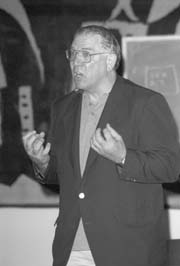
| ||
 | ||
 Howard Lyman PHOTO: OWEN EGAN |
Oprah and the vegan
|
SYLVAIN COMEAU | Howard Lyman may be the most unlikely celebrity ever to speak at McGill.
Lyman is a former cattle rancher from Montana turned advocate for the vegan lifestyle. Like other vegans, Lyman avoids the consumption of any kind of food that comes from animals. That crusade recently landed him in the middle of a media circus starting in 1996, at the height of the mad cow disease scare in England. "On March 20, I was in England, testifying at a trial," Lyman recalled in a lecture earlier this month. Courthouses would soon become very familiar terrain to Lyman. While the expert witness was in England, the country was rocked by a government minister's declaration. "The English health minister stood in front of parliament and said: 'We can no longer assure the English people that mad cow disease cannot be transferred from cow to human.' I was the only person from the U.S. in England willing to talk about mad cow disease. I did 70 interviews in nine days." They included a BBC radio broadcast heard around the world. "I asked the producer, 'How many stations is this on?' He said, 'Two hundred countries. Two thousand stations.' I went in there a poor farm boy. When I walked out, I was a celebrity.'" Shortly thereafter, Oprah Winfrey came calling. Lyman ended up on an Oprah show entitled "Dangerous Food: Could it happen here?" in which the famous host uttered the infamous words: "That just stops me cold; I'll never eat another burger." "Oprah did not say to the crowd: 'Boy, I hope you never eat another burger.' She did not say, 'I think the meat is infected.' All she said was that she would stop eating them." Nevertheless, her comments were enough to rankle a group of cattle ranchers in Texas. Several weeks later, a reporter from a news magazine called and delivered some stunning news. "He asked me: 'By the way, did you know you're being sued along with Oprah Winfrey and Harpo Productions (Winfrey's production company) by a group of Texas cattlemen?'" Lyman says that the lawsuit was a mistake by the cattlemen for two reasons. "There are a couple of things I know about the law. Number one, never sue anyone who has nothing. That's me. Number two, never sue anyone who talks to 20 million people a day. That's Oprah." On their lawyer's advice, the co-defendants decided to fight the case on the grounds of freedom of speech. "My lawyer told me that if we're going to win, we'll have to defend this case so that when the jury members are asked why they found us not liable, they can say 'We didn't do it for them. We did it for you.'" Their other tactic was to discredit the ranchers' expert witnesses one by one. A member of the Chicago Board of Trade testified that the Oprah show had devastated the cattle futures market. The defendants showed a videotape of that witness telling a TV reporter that high grain prices were the real cause. "Not a good witness," Lyman concluded. "For four weeks, we got their expert witnesses to admit that every word I said on that show was true. We never called any expert witnesses of our own; we had their experts supporting us." Winfrey and Lyman won the case, but the cattlemen are appealing the verdict. Lyman's other claim to fame is his contribution to an episode of the Fox animated series, The Simpsons. A long-haired young man who looked like a vagrant off the street had attended one of his talks, and called him after spending all day in the library researching what Lyman had said. "He said, 'I'm the executive producer of The Simpsons. I have a team of 50 writers working for me. Would you come and talk to them?'" The result was the episode in which Lisa Simpson becomes a vegetarian. "It just goes to show that you never know who might be listening. It could be someone who reaches millions of people." Lyman's lecture schedule -- he spends 11 out of every 12 months delivering his message around the world and advising farmers on organic farming -- is driven by his philosophy that if he speaks to enough people, some of them will carry his message of better living through the vegan lifestyle. "Remember that there are enough people in this room tonight to materially change the way things are going in this province. Every time you reach into your pocket for your wallet, every time you spend a dollar, you're betting on one side or another. You're voting on the future." Lyman is the author of The Mad Cowboy. His lecture was presented by Earthsave Montreal, a working group of QPIRG McGill.
|
|
| |||||